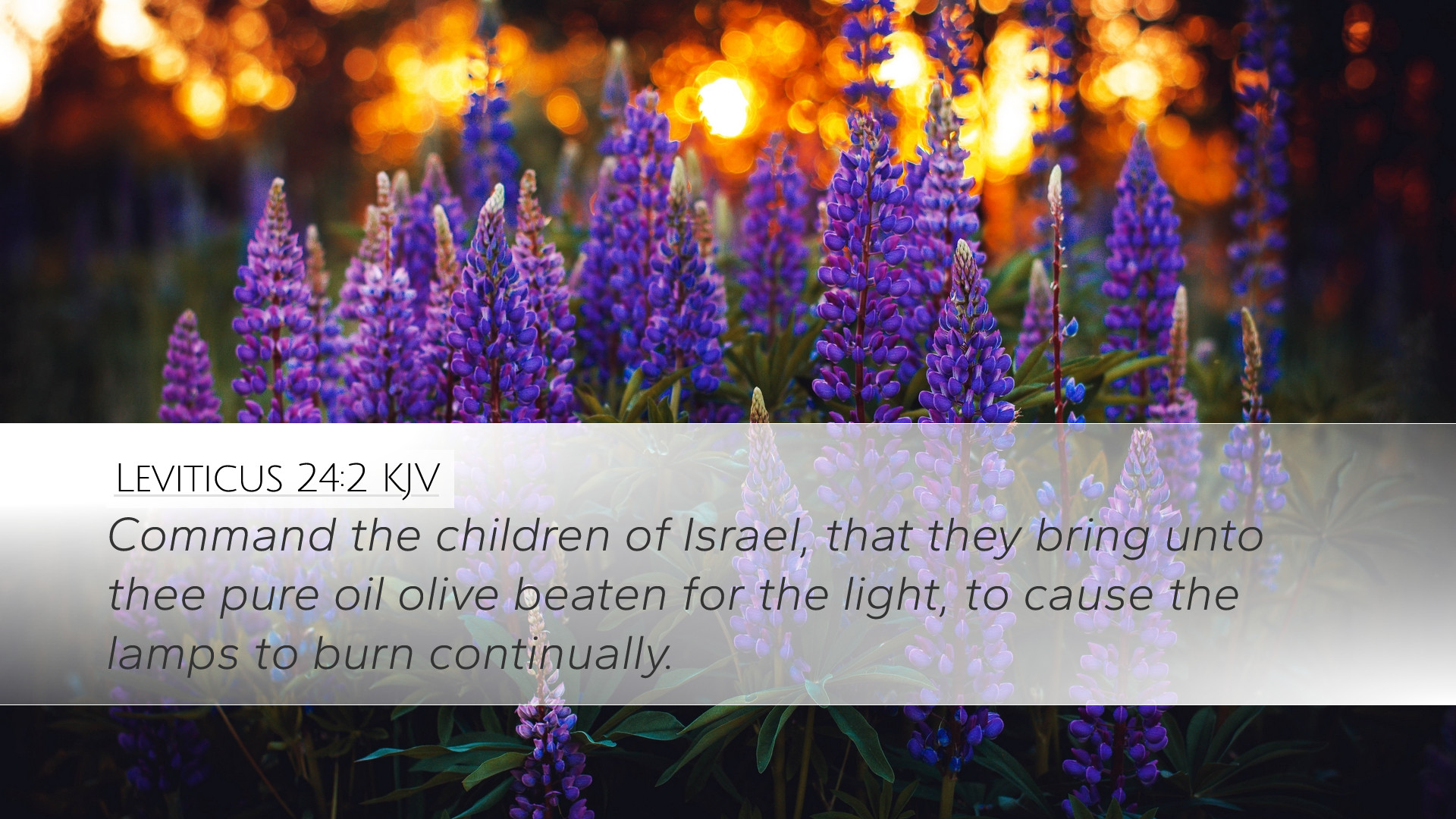Commentary on Leviticus 24:2
Bible Verse: Leviticus 24:2 - "Command the Israelites to bring you clear oil of pressed olives for the light so that the lamps may be kept burning."
Introduction
This verse comes from the section of Leviticus where God gives instructions for the sanctuary and the priesthood. The command regarding the olive oil is rich in symbolism and significance, representing God's provision for the tabernacle's illumination. This commentary seeks to unpack the deeper meanings of this verse as understood by early Church theologians and notable commentators such as Matthew Henry, Albert Barnes, and Adam Clarke.
The Command to Obtain Oil
Matthew Henry's Commentary emphasizes the importance of the oil as a fundamental element for maintaining light in the tabernacle. He notes that the command to procure pure oil indicates not only the necessity of light but also the standard of purity required in worship. The oil symbolizes the Holy Spirit, who is the light in believers' lives. Just as the lamps are fueled by oil, believers are to be continuously filled with the Spirit to enlighten their spirits and guide their paths.
Albert Barnes adds depth by articulating that the phrase "clear oil of pressed olives" signifies the quality and reliability of the material used. Here, the need for authenticity in worship is underscored. The olive oil must be "pure," reflecting the purity of the worship that God desires. Barnes also points out that the oil represents the sustenance and provision of God to His people, constantly renewing their strength and enabling them to shine His light in a dark world.
Adam Clarke takes a theological approach and connects this oil not only to spiritual illumination but also to the life and ministry of Jesus Christ. He draws parallels between the oil for the lamps and the anointing of Christ, who is the Light of the World (John 8:12). Clarke suggests that just as the oil was a vital element for the lamps, the anointing by the Holy Spirit was vital for Christ’s earthly ministry, which brought hope and illumination to humanity.
The Purpose of the Light
The persistent flame of the lamps symbolizes the ongoing presence of God among His people. Henry remarks that the light within the tabernacle served as a reminder of God's continuous guidance and presence. The lamp was not merely for illumination; it represented divine fellowship and the covenant relationship between God and Israel.
Barnes highlights that the requirement for the lamps to ‘be kept burning’ indicates a call for constant worship and vigilance in one’s spiritual life. It calls for a dedication that should not fade or extinguish. This serves as a metaphor for the believer's commitment to maintaining their relationship with God through prayer, worship, and the study of Scripture.
Clarke further notes that the light from the lamps in the tabernacle also signifies the ultimate truth and direction that can only be found in God’s Word. Just as the Israelites were commanded to keep the lamps burning, so too should the followers of Christ keep the light of the Gospel alive through their lives and testimonies.
Symbolism of the Oil and Light
- Holiness and Purity: The requirement for 'clear oil' signifies God's expectation for holiness in worship. A pure offering reflects a heart that seeks God genuinely.
- Indwelling Presence: The oil is symbolic of the Holy Spirit, illuminating the path of believers and empowering them to live righteously.
- Continuous Flame: The ongoing flame represents the need for believers to sustain their faith through regular engagement with God’s Word and worship.
- Illumination of Truth: The light is a metaphor for the revelation of truth and understanding in spiritual matters, guiding believers in their daily lives.
Application for Believers
In considering Leviticus 24:2, modern-day believers are reminded of their role in maintaining the light of Christ in the world. Just as the Israelites were instructed to ensure that the lamps did not go out, pastors, theologians, and laypeople alike are called to be vigilant in their spiritual practices. A life filled with the oil of the Holy Spirit will shine brightly, illuminating the way for others to find hope and truth in Christ.
Moreover, this passage encourages a life marked by purity and sincerity in worship. Barns' insight into the necessity of "clear oil" prompts believers to examine their spiritual lives for anything that may hinder their relationship with God. Integrity in worship practices and a commitment to seek the Lord wholeheartedly lead to a more profound illumination from the Holy Spirit.
Conclusion
Leviticus 24:2 provides not only practical instructions for the Israelites but also profound spiritual insights that resonate through the ages. It teaches the essential nature of the Holy Spirit in our lives, the significance of maintaining purity in worship, and the necessity of embodying the light of Christ in our world. In reflecting upon these truths, believers are encouraged to live in a manner that perpetuates the flame of faith, shining brightly in the darkness and pointing others toward the hope found in Jesus Christ.


